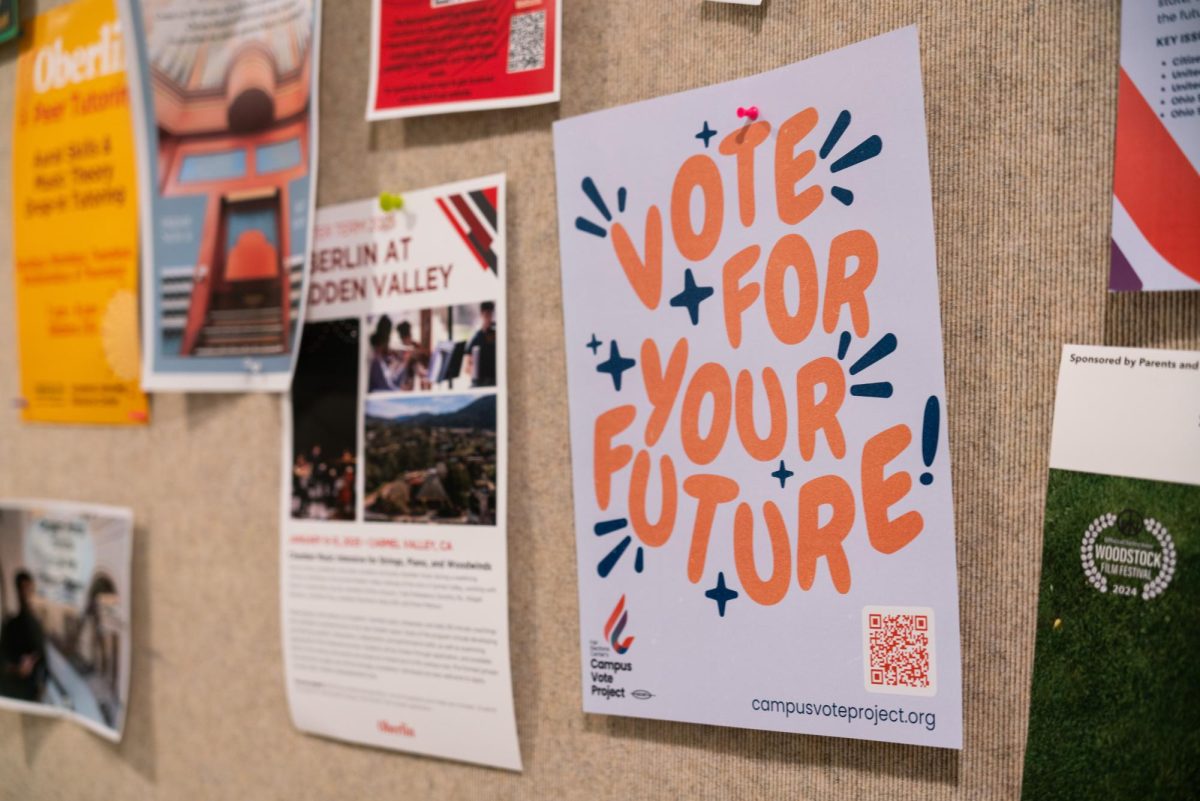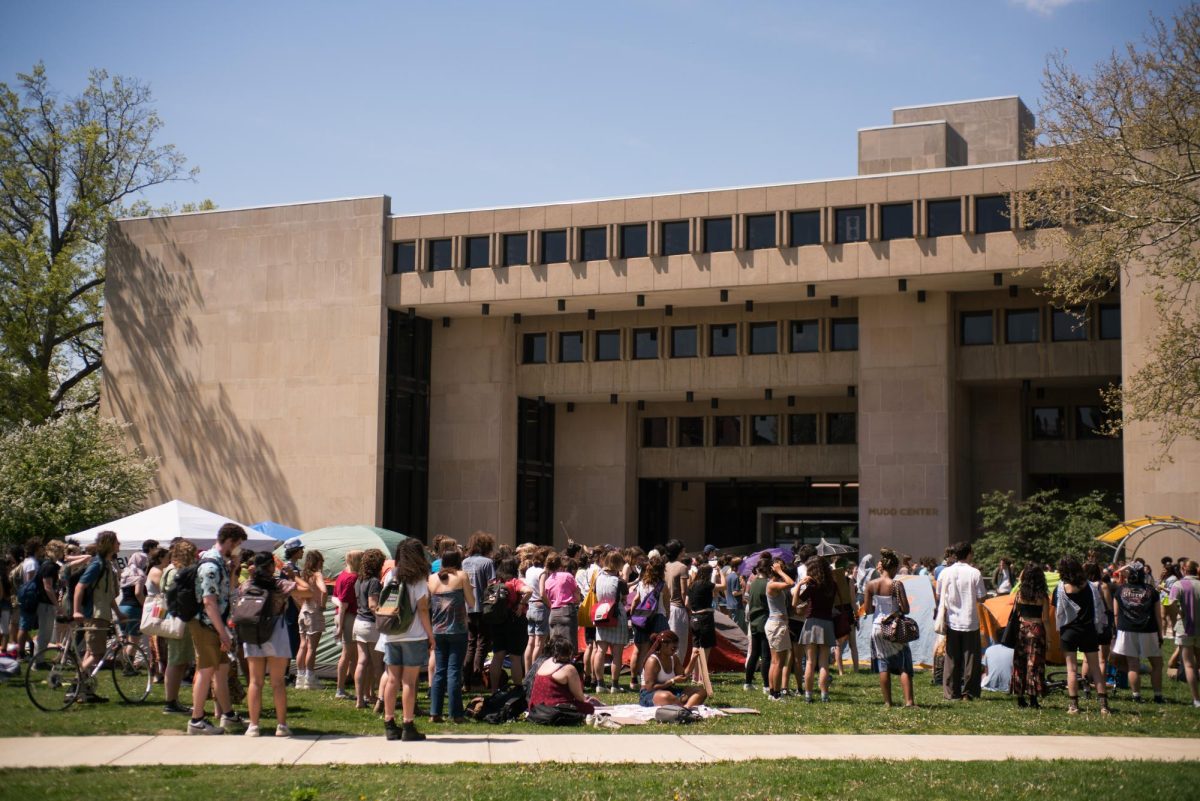I like the act of voting in person on Election Day — going into the voting booth, knowing that my vote has been counted, and leaving with a sticker. Last November, I voted in my first election and was excited to cast my vote in favor of enshrining abortion rights into Ohio law. This year, I voted to end gerrymandering and in a variety of down-ballot races. What I did not do is cast a vote for President of the United States of America.
I write this as a feminist committed to racial and queer justice. I have been organizing for the Equal Rights Amendment and abortion rights since I was 14. I am the Democratic Party’s ideal voter. Should I not, too, be roused by the hollers for hope and joy and the promise that “We’re not going back?” However, my commitments transcend my class position and my nationality, and it is with that in mind that I did not vote for Kamala Harris.
I do not begrudge anyone who is angry with me, unless, of course, they are upset that I did not vote for Donald Trump. I do not seek to castigate Democratic Party loyalists, nor do I have much of a message for them other than the fact that I do not share their politics. I only seek to speak to those who see this election as a matter of picking the lesser of two evils. I empathize with the calculation made by hundreds of thousands to vote to stave off a frightening reality, even if it is only for the time being. In the minds of many, this is all one can do. Yet, for so many, a Harris presidency will not stave off violence and hardship.
Will a Harris presidency not lead to the further denigration of our planet? She remains firmly set in permitting fracking and prioritizing profit over the planet. On immigration, her rhetoric is appalling, refusing to come out against a border wall, a position that not four years ago was a prerequisite for anyone seeking Democratic office. Why would I vote for a candidate who promises to pass a Republican-supported border bill, upon her ascension to power? On the rights of queer and trans folks, Harris did not promise to protect and strengthen trans rights when interviewed by Hallie Jackson; she only said that she would “follow the law.”
Even on what is arguably the best reason to vote for the Harris–Walz ticket — abortion — I unfortunately do not foresee the strengthening of abortion rights. Take it from someone who fought for abortion justice prior to the Dobbs decision: Democratic Party politicians only lost their fear of vocal support for abortion once it became politically expedient.
Over the summer, I subjected myself to both parties’ conventions. I left the Republican National Convention pretty much unmoved in my concern for the ideas floating around in Milwaukee that week, along with being horrified by the three straight nights of calls for mass deportation and admittedly amused at the sight of Donald Trump’s ludicrously large ear bandage. With the Democratic National Convention, I was left sitting in front of my TV feeling enraged. First there was the decision to continue to give an audience to someone as anti-woman as Bill Clinton. Then there was the active maligning of uncommitted, pro-Palestinian delegates who were met with nothing but ire, even as they caved to nearly every demand asked of them by the Democratic Party — a decision that arguably weakened their leverage and alienated the Uncommitted National Movement from other anti-war coalitions.
None of this, however, was all that surprising: what truly sullied the idea of voting for the Democratic presidential candidate for me was the Vice President’s keynote address. My jaw dropped as I heard her promise to ensure that the United States would be the “most lethal fighting force” in the world. No longer could it be argued that the Democrats were trying for a last-ditch effort at some sort of popular front against Trump. In that moment, Harris and the Democrats ceded what last bit of dignity they had as resistance to the warmongering of the 2000s, all for the sake of votes from exurban and suburban moderates, a strategy that failed in 2016.
Ultimately, this leads me to resign to the fact that no matter who wins, the U.S. will continue to arm Israel as it carries out a genocide in Gaza and expands its unjustifiable war on Palestine into Lebanon. That fact alone is enough for me to object to this presidential election, though I must underscore that it is not the only reason. I do not stand to deny the threats to our fundamental rights that a second Trump presidency poses; I fear them, but that does not mean that I am willing to be complicit in violence abroad. I find it appalling that the Harris–Walz campaign is banking on support for abortion rights post-Dobbs while courting surrogates who are proudly anti-abortion.
Further, I am repulsed by the accusation that the decision to not vote for president because of the genocide in Gaza is privileged. It is not privileged to object to genocide, war, imperialism, famine, and sexual violence. Nor is it privileged to want to live in a country where the government has a strong welfare state and uses its resources to fund our communities, social services, and higher education. It is not privileged to believe that a better world is possible and that electoral politics are not going to solve all of our problems. What is privileged, however, is the fact that I have spent too long wasting my time trying to decide whether or not to cast a vote for Harris. I will concede that to write this article is privileged, but I refuse to kowtow to those who say that the emancipation of the most downtrodden and subjugated members of society are simply not worthwhile principles to fight for.
Once more, I do not pretend to ignore the threat of another Trump presidency. The Republican Party’s platform is terrifying, and I can only hope they do not succeed. Still, instead of acting as the bulwark against fascist reaction, the Democratic Party has moved to the right. It scolds those who dare try to connect key issues to a wider political project for a more just America. Maybe this really is the most important election of our lifetimes, but it is with this that I must make my final point: fascism, no matter how hard we try, cannot be defeated at the ballot box.











